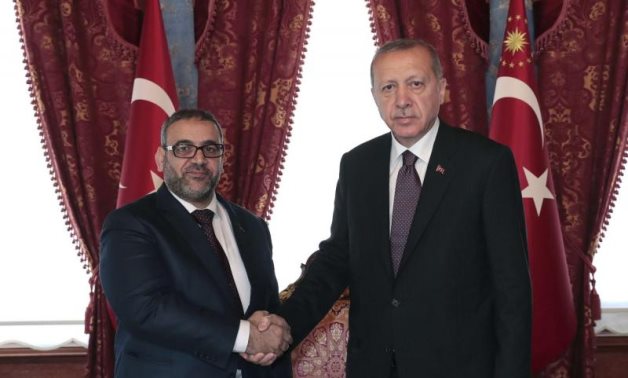
Turkish President Recep Tayyip Erdogan, right, and Khaled Al-Meshri, President of the High Council of State of Libya, shake hands before a meeting, in Istanbul, Friday, April 19, 2019. (AP)
CAIRO – 21 September 2020: Chairman of the Libyan High Council of State Khaled al-Meshry declared on Monday his rejection of the deal reached by Commander-in-Chief of the Libyan National Army (LNA) Khalifa Haftar and Deputy Chairman of the Presidential Council Ahmed Maiteeq on September 18 to resume oil production and export.
The Libyan High Council of State is an advisory entity to the Presidential Council having nine members and chaired by the prime minister of the Government of National Accord (GNA), who is now Fayez al-Sarraj. The nine members include the chairman, five deputies, and five ministers.
The LNA and Libyan tribes in eastern and central Libya suspended the operations of oil fields and ports on January 18 as the revenues were used by the GNA - controlling Western Libya - to fund militias protecting it and hire foreign mercenaries.
6.7K Syrian mercenaries leave Libya, others to arrive: SOHR
CAIRO - 8 September 2020: The Syrian Observatory for Human Rights (SOHR) reported Monday that 6,700 Syrian mercenaries transported by Turkey into Libya left for their homeland. Those returned over batches after their contracts had ended and after they had received their payments.
As a consequence, the Libyan National Oil Corporation (NOC) – controlled by the GNA - sustained losses worth $9.6 billion. It is noted that the revenues used to be disbursed to Libya's central bank also controlled by the GNA.
The disagreement between Meshry and Maiteeq is not the first within the GNA, as Prime Minister Sarraj decided on September 8 to keep Minister of Interior Fathi Bash Agha in his post after he had suspended him over violations against protesters. The decision followed a meeting of the two of them
News about a shadowed dispute between the two men had been circulating. By the end of August, such conflict rose to the surface amid fears of evolving into an armed one.
That followed the declaration of a ceasefire between the Tripoli-based GNA, which is an interim non-elected government that is recognized by the United Nations, and the elected House of Representatives based in Tobruk.
The GNA said that the ceasefire should include the disarmament of Sirte and Al Jufrah, and the resumption of oil production while freezing the use of its revenues at the Central Bank of Libya until an agreement is reached. On the other hand, the House of Representatives mandated the dismantling of militias and the deportation of foreign mercenaries in order to achieve a ceasefire.
Sources told Sky News Arabia that Tripoli militias had foiled a coup attempt by Bash Agha, Chairman of the High Council of State Khaled al-Meshri, and the Muslim Brotherhood.
Sources told Al Arabiya that Turkey sent a security delegation to Tripoli in order contain the ongoing conflict between Sarraj and Bash Agha.
The sources estimated that significant consequences will ensue from such conflict, which can possibly give rise to a collision between militias affiliated to each of Sarraj and Bash Agha. The ones supporting the latter belong to Misrata from which Bash Agha descends as well as Meshri. Such behavior is expected given Libya is a tribal society.
Bash Agha posted on August 27 photos of himself and Turkish Defense Minister Hulusi Akar in Ankara saying they discussed matters of mutual interest.
On August 28, the GNA suspended its Minister of Interior Fathi Bash Agha so he would be interrogated – within 72 hours - on the brutality committed against peaceful demonstrators during what is dubbed "August 23 Protests." His deputy, Khaled al-Tigani, was assigned to hold the post temporarily.
6 Libyan protesters abducted by Al Nawasi militia in Tripoli protests: Amnesty International
CAIRO - 27 August 2020: Amnesty International stated Wednesday that it had been informed that at least six Libyan demonstrators were abducted and that several others were wounded by armed men who fired live rounds as they used heavy machine-guns to disperse peaceful protesters demanding economic rights.
Tripoli militias – affiliated to Sarraj - celebrated the dismissal of Bash Agha by firing guns into the air.
In order to mitigate the impact of the decision, particularly after Misrata's notables had described the clash as personal, Sarraj appointed a chief of staff who was the leader of a Misrata militia.
The GNA appointed on August 29 evening new Minister of Defense and Chief of Staff. Those are Salah El Din Ali Al Namroush, and Mohamed Al Hadad, respectively.
The new minister of defense belongs to Al Zawiyah town which also witnessed protests against the GNA.
Upon arrival to Tripoli's Mitiga airport after visit to Ankara, Bash Agha told press that "I'm not against any group or individual. I'm talking about a disease called corruption," as reported by France 24. Bash Agha – who took office in 2018 - was received by 300 armed vehicles that belong to Misrata militias amid tensions with Tripoli counterparts over the dismissal decision, according to Al Arabiya.
As protests persisted for the sixth day in a row, militias affiliated to Sarraj blocked on August 28 the entrances of Tripoli by establishing checkpoints there.
Sources told Sky News Arabia that armed vehicles had left Misrata to Tripoli in order to support Al Nawasi militia and others as protesters got death threats from the GNA militants.
Spokesperson of "August 23 Youth's Willpower" movement, Ahmed Abou Arqoub, told Sky New Arabia that demonstrators are being oppressed by the GNA militias and "foreign mercenaries." The activist accused former GNA interior minister, Bash Agha, of funding the militias to quell the protests.
Comments
Leave a Comment